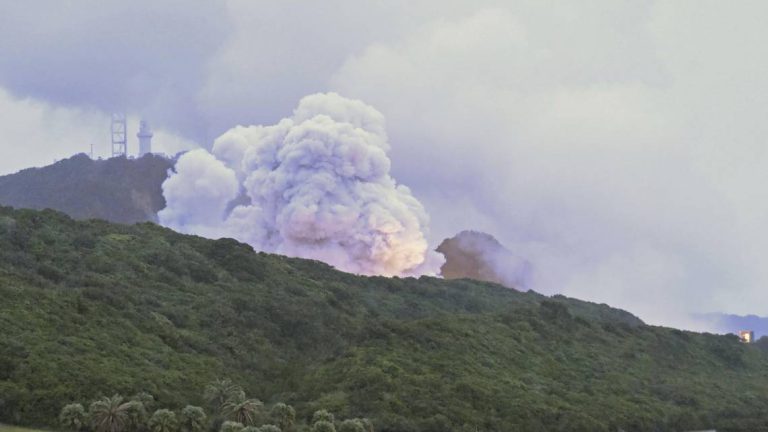Japan’s New Space Rocket Engine Faces Another Explosion: What Went Wrong?
Japan’s Epsilon S rocket engine has experienced a second consecutive explosion during testing, casting a shadow over its anticipated debut launch next year.
Summary
- Japan Aerospace Exploration Agency (JAXA) faces renewed scrutiny after the Epsilon S rocket engine exploded during a combustion test.
- This marks the second consecutive failure of the Epsilon S rocket’s engine development in just over a year.
- Tuesday’s explosion occurred at Tanegashima Space Center, located in Kagoshima Prefecture.
- Despite the explosive incident, no injuries or external damage were reported.
- Chief Cabinet Secretary Yoshimasa Hayashi confirmed that a thorough investigation was underway.
- The Epsilon S rocket is a critical part of Japan’s goal to achieve autonomy in its space development program.
- The rocket’s design promises enhanced payload capacity and improved cost efficiency compared to its predecessor, the Epsilon rocket.
- Previous engine failures were attributed to ignition system issues, with corrective measures implemented thereafter.
- Japan’s larger H3 rocket program has recovered successfully after initial setbacks, providing a contrast to the Epsilon S struggles.
- The H3 rocket has achieved three consecutive successful launches, restoring confidence in Japan’s space industry.
- Analysts believe Epsilon S’s success is crucial to compete in the growing small satellite launch market.
- The repeated failures of Epsilon S threaten confidence in Japan’s ability to meet its ambitious space exploration and commercial objectives.
- The global satellite launch market remains lucrative, and small rockets like Epsilon S are key for Japan to secure a competitive edge.
- The government remains committed to advancing space exploration despite the setbacks.
- A successful resolution of these issues could reaffirm Japan’s position among leading space-faring nations.
Introduction
The Japan Aerospace Exploration Agency (JAXA) has encountered a serious challenge in its quest for space exploration autonomy. The Epsilon S rocket, a smaller yet highly anticipated addition to Japan’s fleet, suffered a catastrophic engine explosion during testing on November 26, 2024. This is the second time in two years that such a mishap has occurred, raising pressing questions about its readiness and reliability.
The Epsilon S rocket is a key part of Japan’s plan to boost its space industry. It is designed to be better than the earlier Epsilon rocket. This new model can carry more weight and is more cost-effective. The main goal of the Epsilon S rocket is to help Japan become a leader in the competitive market of launching small satellites.
“Development of flagship rockets such as Epsilon S is extremely important from the perspective of ensuring autonomy of Japan’s space development,” said Chief Cabinet Secretary Yoshimasa Hayashi during a press briefing, emphasizing the significance of the project.
Key Challenges for the Epsilon S Rocket
Testing Challenges
The recent explosion follows a similar engine failure from the previous year, which was attributed to ignition system malfunctions. Despite implementing corrective measures, the issue has resurfaced, signaling potential systemic problems in the rocket’s development process.
The combustion test at Tanegashima Space Center was intended to validate the improvements made after the earlier mishap. However, the setback has forced JAXA to reevaluate its design and testing protocols.
Comparison with the H3 Rocket Program
| Rocket Type | Status | Key Features |
|---|---|---|
| H3 Rocket | Recovered from initial failure | Larger payload capacity, focus on reliability |
| Epsilon S | Facing repeated test failures | Small payloads, cost-efficient design |
The H3 rocket program, also under JAXA, provides a contrasting narrative. After a failure during its debut launch in February 2023, the H3 has achieved three successful launches consecutively. This rebound highlights JAXA’s ability to overcome challenges, albeit in a different program.
Financial and Commercial Implications
The global satellite market is rapidly expanding, with smaller rockets playing a vital role in deploying constellations for telecommunications, earth observation, and more. For Japan, the Epsilon S rocket is key to capturing a share of this lucrative sector.
However, the repeated failures have created uncertainty among stakeholders and potential clients. This could hamper Japan’s ability to compete against other established players in the small rocket market, such as SpaceX’s Falcon 9 and Rocket Lab’s Electron.
Global Context of Small Rocket Programs
| Country | Rocket | Key Strengths |
|---|---|---|
| USA | Falcon 9 | High reliability, reusable design |
| New Zealand | Electron | Focused on small satellites |
| Japan | Epsilon S | Cost-efficient, compact design |



